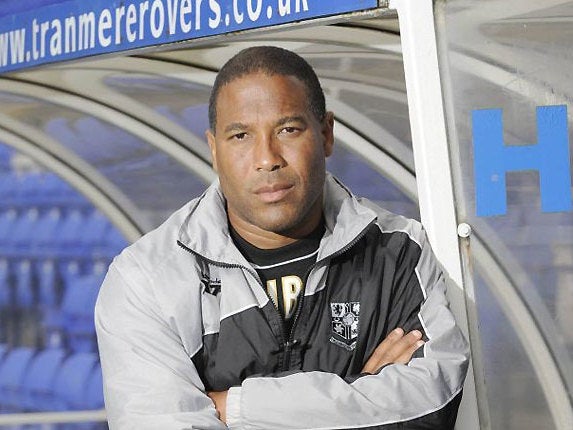'Clubs still think black managers lack intelligence,' says Barnes
Barnes attacks culture of racism that has slammed door on a 'lost generation'

Your support helps us to tell the story
From reproductive rights to climate change to Big Tech, The Independent is on the ground when the story is developing. Whether it's investigating the financials of Elon Musk's pro-Trump PAC or producing our latest documentary, 'The A Word', which shines a light on the American women fighting for reproductive rights, we know how important it is to parse out the facts from the messaging.
At such a critical moment in US history, we need reporters on the ground. Your donation allows us to keep sending journalists to speak to both sides of the story.
The Independent is trusted by Americans across the entire political spectrum. And unlike many other quality news outlets, we choose not to lock Americans out of our reporting and analysis with paywalls. We believe quality journalism should be available to everyone, paid for by those who can afford it.
Your support makes all the difference.John Barnes, the footballer who braved the torrent of abuse which epitomised Britain's racial intolerance of black players in the 1980s, has declared that a generation of black managers is being lost to the sport because of a belief that they lack the intellectual ability of their white counterparts.
Barnes, who comes face to face with one of only two other black managers, Paul Ince, when his Tranmere Rovers side face Ince's MK Dons tonight, has struggled for nine years to regain a position in British management after his brief and ultimately unsuccessful spell at Celtic ended in 2000. He has put that struggle down to the sport's failure to give a black manager the same second chance as a white one. Though Ince found work again, seven months after his brief Blackburn tenure ended, he has reverted to the League One side which he left for the top flight.
"Until we are considered to be intellectually equal, we will never be equal," Barnes said. "In the 1970s you didn't have black goalkeepers or centre-halves – or not many. If you were a black player you had to play on the wing where you're fast and didn't have to think too much. These are all the misconceptions people had.
"Then all those myths were dispelled and you had players like [Portsmouth's] David James and Sol Campbell coming through and this whole stereotype about black players playing in certain position or not being very good in the winter has slowly been dispelled. Now you have black coaches in the academies but until you say 'this man has the same intellectual ability whether he is black or he is white' there is still that same question mark.
"In the '70s there was a generation of black goalkeepers and centre-halves lost to the game of football. The 1990s and the early 21st century, to 2020, will be the decade when potential black managers will be lost to the game of football. So when Theo Walcott is a 45-year-old black manager he will speak to black players who will say, 'We can't believe you have to go through that, we don't have to go through that.' My contemporaries and I are the management equivalent of those black centre halves."
Barnes (left), who joined Liverpool from Watford in 1987, endured racist abuse as a player, once famously backheeling a banana that had been thrown at him. He was unwilling to be interviewed for Out of his Skin, the John Barnes Phenomenon, Dave Hill's seminal book, published in 1989, which explored his treatment. But while his ability on the field of play – he helped Liverpool to their last league title 20 seasons ago – gave Barnes the last word against those who heaped vitriol upon him, a dozen attempts to get jobs in management since Celtic sacked him (after the club's Scottish Cup defeat by Inverness Caledonian Thistle) have failed to elicit a single interview and none of the Premier League clubs he has approached, supported by recommendations from Graham Taylor, Sir Bobby Robson and Terry Venables, have responded to him. White managers would have had been given another chance, Barnes said.
"There's nothing you can do because you can't tell a chairman to give you a job," said the former England international, who was hired by Tranmere, having managed his native Jamaican national side through a run of 11 games unbeaten.
Barnes' desire to return to management at any professional level has seen him take up the reins at the Birkenhead club. Tranmere have been put up for sale by their owner, Peter Johnson, and have seen five of last season's regular first XI leave the club as the wage bill has been slashed by a third.
League Two Macclesfield Town's Keith Alexander is the only other black manager in the Football League. The former Luton Town player Ricky Hill was named their manager in July 2000 but sacked 11 months later and has never returned to British management. Keith Curle lasted five years between Mansfield, Town, Chester City and Torquay United and is now a coach at Crystal Palace.
Join our commenting forum
Join thought-provoking conversations, follow other Independent readers and see their replies
Comments